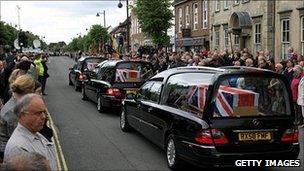Andrew Robathan defends 'dignified' repatriation route
- Published

Wootton Bassett is being renamed Royal Wootton Bassett in recognition of its efforts to honour the dead
Defence Minister Andrew Robathan has said the new route for repatriating forces personnel killed in action will be "dignified, respectful and solemn".
It follows a Facebook campaign, external saying the war dead were to be "shoved out the back door not through our town centre".
Mr Robathan admitted he had been to RAF Brize Norton to "reassure" himself after receiving emails on the topic.
From September repatriations, which have gone through Lyneham since 2007, will go through Brize Norton.
It means an end to the scenes in the Wiltshire town of Wootton Bassett, where crowds have lined the streets to pay their respects to the fallen - the town is being renamed Royal Wootton Bassett to recognise its efforts.
'Side gate'
But the change of route has sparked anger in some quarters because the bodies will not be driven through the town of Carterton, amid suggestions that the intention was to avoid the public.
Mr Robathan has been criticised over comments made to BBC Oxford, in which he said: "The side gate was seen by the Ministry of Defence and the police as the most appropriate way to take out future corteges.
"I am not sure taking coffins in hearses past schools, past families, past married quarters is necessarily the thing that everybody would wish to see ... the focus must be on the families of the dead service personnel. They are the people who care most. That is where our focus is."
Thousands of people have joined the Facebook page which suggests "The people in power want our troops shoved out the back door not through our town centre".
Asked about response to the plans in the Commons on Monday, Mr Robathan admitted a "number of emails and letters" had been received on the topic, due to the Facebook campaign, and told MPs he had visited RAF Brize Norton to "reassure" himself.
Conservative MP Mark Pawsy said many people believed that the public should be able to "continue to be able to pay their respects to fallen military personnel" and asked for assurances that would still be the case.
Mr Robathan said the RAF was spending £3.2m on a repatriation centre for the bereaved and that the families of those killed must be the "focus of our attention".
'Right thing'
He said RAF Lyneham had only "ad hoc" facilities and he hoped people would come to realise the RAF and county council were doing "the right thing for the bereaved and for the servicemen who have been killed".
He said there would also be private chapels of rest for families to spend time with their loved ones' remains adding: "The cortege will then head down a very dignified avenue of limes to the nearest gate, which is being refurbished and being called the Britannia gate. It is dignified, respectful and solemn."
Oxfordshire County Council was also building a memorial garden, with car parking, so those who wished to show their respect could do so "in a dignified and proper place", he said.
But he was accused of "missing the point" by Labour MP Paul Flynn, who said people wanted to replicate the "very moving scenes" that happened at Wootton Bassett - because the route was being taken through rural roads, not the "urban areas".
"Shouldn't the people of Brize Norton and the surrounding areas be able to express the grief of the nation, in order that we are all reminded of the true cost of war?," said the Labour MP, who co-chairs the Commons "Afghanistan Withdrawal Group with Green MP Caroline Lucas.
Mr Robathan said the route would go through the village of Brize Norton, but would not go through the nearby town of Carterton, which had narrow roads with speed bumps "which are not very suitable for corteges".
"This has been decided by Oxfordshire County Council in consultation with local people - there's been no suggestion of this being done covertly."
"We wish to allow the British public to show their respect for these people, these heroes, but we are not necessarily going to be driven by one person on the radio."
Conservative MP for North Wiltshire James Gray suggested it might not be "possible, nor indeed quite right, to seek to replicate the 'Wootton Bassett effect'" - which had been a "chapter in our history".
- Published8 June 2011
- Published16 March 2011